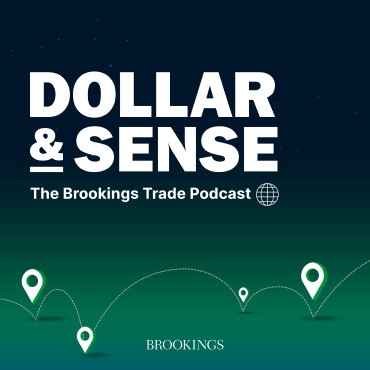President-elect Biden has made it clear that restoring America’s standing with allies will be a priority for his administration. In this episode, Constanze Stelzenmüller explains how the administration can begin to repair the important trans-Atlantic relationship. Stelzenmüller and David Dollar discuss recent tensions between the United States and Europe, a new investment deal between China and the European Union, and how the U.S. and EU can coordinate a common approach toward China.
Related content:
Stronger Together: A Strategy to Revitalize Transatlantic Power
Hostile ally: The Trump challenge and Europe’s inadequate response
More Ambition, Please! Toward a New Agreement between Germany and the United States
DOLLAR: Hi, I’m David Dollar, host of the Brookings trade podcast, “Dollar & Sense.” Today, we are going to talk about the U.S. and Europe. My guest is Constanze Stelzenmüller, a senior fellow in the Center for the United States and Europe at Brookings. She is a leading expert on trans-Atlantic relations and German foreign policy in particular. So welcome to the show, Constanza.
CONSTANZE STELZENMÜLLER: Thank you very much for having me, David.
DOLLAR: So we are speaking on the eve of Joe Biden’s inauguration. In the campaign, he emphasized that he wants to repair relations with allies, and in my view there’s no more important ally than the European Union. So let’s start with the big picture: What are the most important things for the Biden administration to do in order to restore relations with our European allies?
STELZENMÜLLER: It’s hard to know where to start, frankly. I was part of two trans-Atlantic, American-German working groups over the last year, and I think the reports that they produced were more wide-ranging and broader than I think they would have been at any other time in my working life. I think the first order of the day is to undo some of the damage wrought by the Trump administration. One of the reports I was a part of refers to trade policy under Trump as a “trans-Atlantic graveyard.” But the larger challenge, I think, is to adapt the trans-Atlantic relationship, including on trade, into something that is more effective, more resilient, and more legitimate in an era that is characterized both by global competition and by deepening interdependence—the latter being something that the Trump administration and many European nationalists simply refuse to acknowledge. I think those are the two key factors we have to keep in mind.
Then the issues—frankly, if you are asking me for two or three, I would say on the institutional level repairing NATO and the U.S.-EU relationship. The overarching issues are democracy and China. And, of course, trade and technology are key to all of that.
DOLLAR: I guess I’m a little bit surprised you didn’t mention climate change.
STELZENMÜLLER: You are quite right. That should come under the overarching issues, absolutely. I’m not a climate change expert, but that is clearly becoming more and more urgent by the week.
DOLLAR: So you referred to the economic graveyard. Can you get a little bit more specific about what are some of the issues that have come up in the economic relationship between Europe and the United States? Things that the Biden administration will have to deal with?
STELZENMÜLLER: Sure. I think we should keep in mind that the U.S. Trade Representative and DG-Trade, the department of the EU that’s in charge of trade and in fact that the European member states have handed the trade responsibility off to, have been at each other’s throats for decades. We, I think, all remember how unhappy even the Obama administration’s Treasury secretaries were with European trade surpluses. There were always fights. And I think it’s also only fair to say that the U.S. has always wielded its economic power, not just against adversaries or challengers, but also occasionally against its allies in the form of sanctions. But it did that in the framework of a principled stewardship of a global free trade system. The high point of that was engineering China’s entry into the WTO, the World Trade Organization. But what happened under Trump was just a complete shift in the framing of the relationship between America and Europe—and not just on trade.
I wrote about some of this in a paper the year before last that I called “A hostile ally,” and that gives you a sense of where I’m going with this. I think the best word for this is one that was identified by Henry Farrell and Abraham Newman, the weaponization of economic interdependence. Again, ironically, since so many of the economic policy officials in the Trump administration were all about decoupling America from globalization. But the ideological framing of the Trump administration’s economics was great power competition, suspicion of multilateralism and trade agreements, economic nationalism and sovereignties, and outright hostility to globalization. You remember the famous Trump quote, “trade wars are good and easy to win.”
Then, of course, there was a very specific hostility to the European Union, which President Trump essentially viewed as a rival mob. He called it an enemy worse than China but smaller. And of course, most concerning for the Merkel government sitting in Berlin, he viewed it also as a front for Germany. The instruments for this were punitive tariffs, using national security grounds, sanctions, blocking the appellate body of the WTO dispute settlement mechanism, and so on and so on.
All of that made for a really fraught, conflictual relationship. I will say that I think there were more actions threatened than actually implemented. Yes, there were some tariffs on European aluminum and steel, but on car imports, for example, the threats remained threats. I think the most concerning issue of this part of the trans-Atlantic relationship over the past four years looking back was really the incoherence of the Trump administration’s approaches.
So I think Europeans, and Germans specifically, are very relieved to know that with Joe Biden the U.S. will have a president who cares about international order and agreements, appreciates not just Europe but the European Union as a partner, and sees the European Union as a potential instrument of American leverage.
The Brookings Institution is committed to quality, independence, and impact.
We are supported by a diverse array of funders. In line with our values and policies, each Brookings publication represents the sole views of its author(s).






Commentary
PodcastMoving from contention to cooperation in the trans-Atlantic relationship
January 19, 2021
Listen on
Dollar and Sense Podcast